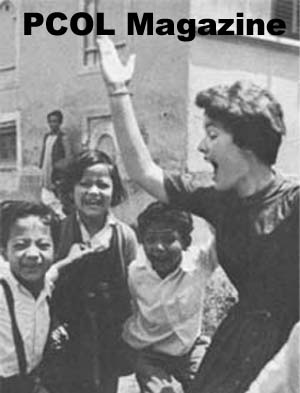
More than 55 million Americans have traveled to other countries on vacations that included volunteering, according to the Travel Industry Association of America. The number reflects a growing interest in giving back: Nearly 30 percent of those 16 and older last year participated in service projects, according to the U.S. Bureau of Labor Statistics.
Students flock to volunteer in exotic locales around the globe
3d World risks don't deter a new generation: Students flock to volunteer in exotic locales around the globe
Jul 2, 2006
The Philadelphia Inquirer
Jul. 2--Volunteering in Tanzania last summer, Danielle Ryan got used to her constantly upset stomach from parasites in the food and water. Even when some in her group contracted malaria, she was unfazed.
"It was nothing that wouldn't make me want to be there," Ryan, 22, of Huntingdon Valley, said of her work at a medical clinic in southeast Africa.
Ryan is one of a growing number of altruistic, adventure-seeking students -- the most volunteer-oriented generation in decades -- who are reaching beyond their communities to aid scientific field research, work in orphanages, and build houses in outposts worldwide.
With stars such as Angelina Jolie modeling international activism, doing good works abroad is their equivalent of backpacking across Europe.
For parents, who subsidize that charity -- yes, volunteering costs money -- the time until their kid returns is filled with anxiety.
"We were so nervous," Pat Ryan, a teacher at Northeast High School, said of her stepdaughter's stint overseas, though she tried not to let on.
Despite program organizers' precautions, there is always risk in travel to a developing nation. In May, Sarah LeCates, a Cherry Hill student, died of an unknown illness while trekking through Mali after completing a health internship in Senegal.
LeCates, 20, spent last summer building homes in Mexico, and planned to join the Peace Corps after graduating from the College of William and Mary.
"That's the thing you spend your life doing: making sure your kid is safe. So you worry," said Nancy Sirolli-Hardy of Wyndmoor. Her daughter, Blair Sirolli, worked three weeks in a Romanian children's clinic.
The May trip opened her eyes to a new culture, Sirolli, 19, said. It also exposed her to a serious intestinal disorder and a wave of bird flu in Romania.
The Seton Hall sophomore didn't tell her parents about the bird flu, which was not found in humans there, until she got home.
More than 55 million Americans have traveled to other countries on vacations that included volunteering, according to the Travel Industry Association of America. The number reflects a growing interest in giving back: Nearly 30 percent of those 16 and older last year participated in service projects, according to the U.S. Bureau of Labor Statistics.
The volunteer movement is particularly strong for young people. Among nearly 264,000 incoming college students last fall, 83 percent said they had given their time during the previous 12 months, the highest rate in the nearly 40-year history of the Cooperative Institutional Research Project's Freshman Survey. Two-thirds said they likely would volunteer more.
The students are especially oriented toward international issues. Undergraduates trust the United Nations more than they do the president, according to findings last year by the Harvard University Institute of Politics. To them, hands-on activism is a form of political engagement.
This heightened social responsibility and youth's timeless wanderlust have led to a booming niche of nonprofit volunteer- vacation coordinators. Break Away, a Tallahassee, Fla., group that encourages college kids to make the most of their vacations, expects to match 13,000 students from 95 campuses to service projects this year. In 2006, 26 schools are sponsoring international trips, up from 14 two years ago.
"There's such a global awareness among students. It's not uncommon for high school groups to go on international programs. In college, it's almost a rite a passage," said Barbara DeGroot, of Global Volunteers in St. Paul, Minn. This year, the group will send 1,600 people -- up 60 percent from 2001 -- to 20 nations, including Peru, India and Jamaica.
Much of the increase is among teens. In 2002, 10 percent of Global's clients were under 20; this year, 15 percent.
Cross-Cultural Solutions, with offices in New York and England, will send more than 3,000 volunteers -- up from 2,217 last year -- on one- to 12-week service tours on six continents. Nearly half the participants will be between 18 and 24.
Students "want to go out there and do something good in the world. These are life-changing experiences for them," said Kam Santos, of Cross-Cultural.
Jill Piacitelli, director of Break Away, said the growth in volunteer tourism is in international destinations.
"Current events are drawing students to interest in social issues beyond our borders," she said -- despite, or maybe to make amends for, what the Pew Research Center recently found to be an eroding U.S. image.
A dangerous locale can be part of the appeal, said Robyn Shepherd of InterAction, a clearinghouse for agencies.
"We send a lot of people to the Gaza Strip and the West Bank," she said. "It's been terrible for the people there and for many, many years students wanted to see what it's like."
While most agencies redline countries that are subject to State Department travel warnings, Shepherd said, InterAction was a link to programs in some prohibited areas. Nepal was off limits for a time during civil unrest, but has been reinstated.
"We make the volunteer aware of it. It's their choice," she said.
Participants stay in modest accommodations, eat local food, get dirty and wet, and see heartbreaking poverty and illness. They typically pay about $3,000 for a three-week experience, but can stay longer.
Most sponsors are nonprofits looking for people who want a more intense cultural experience than the usual beach vacation provides. Some combine sight-seeing with altruism, touring before or after their work weeks.
Unsure what to do after graduating from Rutgers, Lauren Brossy spent 12 weeks in Costa Rica at her mother's urging.
Sometimes, Margaret Brossy wondered what had gotten into her.
"You worry about a lot of things," the Moorestown telecommunications consultant said. "I spent a fortune on the latest, greatest [insect] sprays and water-filtration systems."
Sundays were hardest as she waited for her daughter's weekly phone call. "I would have this nagging feeling: Suppose she doesn't call. Where do I even begin to look?" she said.
Lauren worked in an orphanage but traveled on weekends and after her program. Participants were given safety advice about traveling in groups, towns to avoid, and food.
She had such a great time that she now works for Cross-Cultural Solutions and has been to Guatemala and Brazil.
"We make a really secure, safe framework for our programs," said DeGroot, of Global Volunteers, which dropped its Indonesian programs six years ago because of terrorism.
"We've been working with these communities for many years," she said. "They welcome our volunteers, they bring them into the communities, and the whole community really watches out for them."
That was Ryan's experience in Tanzania, where she helped a doctor at a clinic in Moshi. Traveling the village, the Temple University graduate -- who plans to start medical school next month -- was shocked by the poverty. But she also was overwhelmed by people's warmth.
"It's different from slums over here. Children were playing on dirt floors, and that's their bed," Ryan said. She and others lived and ate in the program director's house with a guard posted outside at night.
Parents say they battle the urge to protect their children but respect them enough to let them do what they want to do.
"She's made excellent decisions," Nancy Sirolli-Hardy, deputy secretary for the Pennsylvania Office of Children, Youth and Families, said of her daughter. "She's very resourceful."
Even when Blair called and said she had been vomiting for 48 hours, Sirolli-Hardy was stoic. "If she needed to come home, she would do it."
Next summer Blair hopes to visit Africa or Indonesia to work in HIV/AIDS education. Though the idea makes her nervous, "things will happen everyplace," Sirolli-Hardy said. "Blair has this enormous heart that just keeps on giving, and I want her to be able to do that."
Where to Volunteer
Cross-Cultural Solutions: one- to 12-week volunteer programs in 10 countries; 800-380-4777; http://www.crossculturalsolutions.org.
Global Volunteers: 100 volunteer programs on six continents, including the United States; 800-487-1074; http://www.globalvolunteers.org.
Habitat for Humanity International:short-term house-building trips with scheduled projects in Asia, Africa, Europe and Latin America; 800-422-4828; http://www.habitat.org.
Earthwatch Institute: since the 1970s, more than 75,000 volunteers have aided scientists in field research around the world; 800-776-0188; http://www.earthwatch.org.
Contact staff writer Kathy Boccella at kboccella@phillynews.com or 610-313-8123.





















